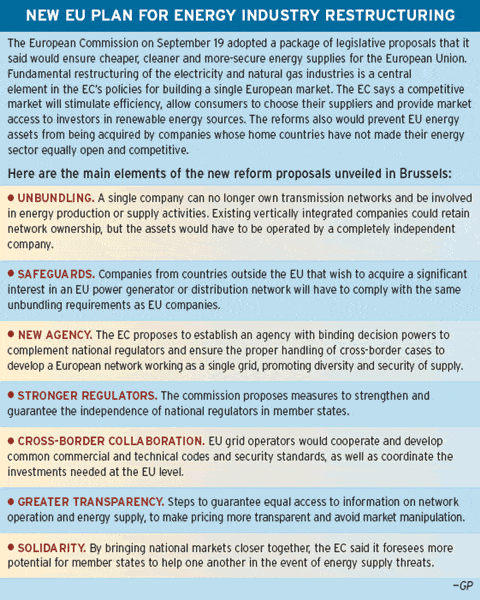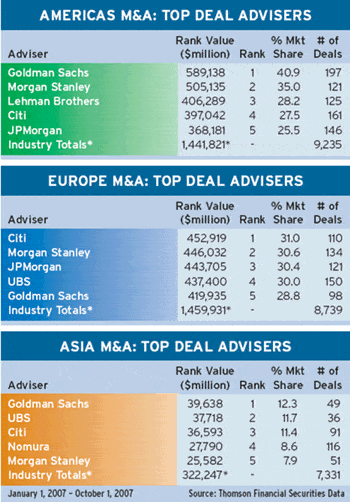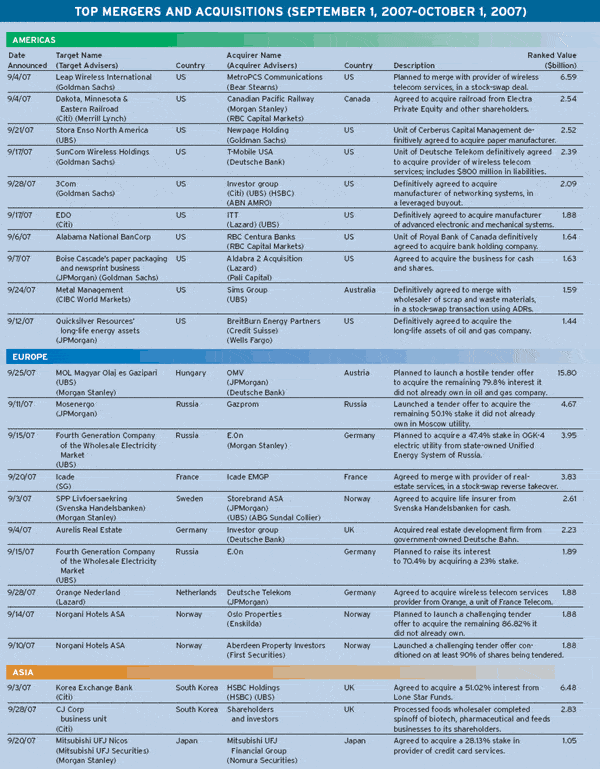Energy companies are fueling a merger boom in Europe, as the industry continues to restructure in response to liberalized markets and foreign competition. Investment bankers are welcoming the advisory fees from these huge deals at a time when leveraged buyouts have been largely put on hold amid the fallout from the subprime mortgage crisis.
Vienna-based OMV, Austria’s leading oil and gas company, launched a hostile bid for Hungarian rival MOL in September that values the Budapest-based firm at $15.8 billion. JPMorgan and Deutsche Bank are advising OMV, while UBS and Morgan Stanley are the financial advisers for MOL.
Meanwhile, Paris-based Gaz de France (GDF) and Suez, a Franco-Belgian group with European activities, have finally agreed to merge after 18 months of negotiations, creating the fourth-largest energy group in the world.
In other major European energy deals this year, Spain’s largest electric utility, Endesa, has been the target of takeover bids by Germany’s E.On and Italy’s Enel. Scottish Power purchased Spain’s Iberdrola in April, creating the third-largest electric utility in Europe.
Russia is dismantling its national utility, Unified Energy System, and plans to spend $120 billion in the next four years to upgrade its generation and transmission facilities to meet its growing power demand. Europe’s largest utilities, including E.On and Enel, are acquiring stakes in Russian power generators and have pledged to install new capacity.
A combination of OMV with Hungary-based MOL presents a unique strategy opportunity to create one of Europe’s leading integrated oil and gas companies, with a focus on the fast-growing regions of central and eastern Europe, according to the board of the Austrian company. It says the merger will significantly enhance security of energy supply throughout the region for the combined group through greater diversification of crude oil supply, as well as the greater scale in upstream operations to generate additional growth of its energy resources.
The issue of energy security for the CEE was in the headlines last month when Russia’s state-owned energy company Gazprom warned Ukraine that it would reduce gas supplies to the country if it failed to pay the more than $1.3 billion it owes Russia. The government of Ukraine agreed to pay its debt to avoid the cutback.
In a price dispute last year, Gazprom cut off its shipments to Ukraine, creating a serious supply shortage for European Union countries that depend on Russian gas. In January 2007, Russia cut off oil supplies to Belarus for three days after claiming that the country had been illegally siphoning off oil from its pipelines. The EU imports 82% of its oil and 57% of its gas.

Countries such as France and Germany are trying to build up national energy champions at a time when the European Commission in Brussels is fighting to break up vertically integrated energy companies to stimulate competition and encourage alternative sources. José Manuel Barroso, the EC president, says there is a clear preference for unbundling integrated power companies such as E.On and RWE of Germany and Électricité de France (EDF).
The EC in September issued a series of reform proposals that would require the unbundling of ownership between production and distribution networks. The same would apply to EU suppliers, such as Russia’s Gazprom.
Meanwhile, many European countries are erecting protectionist barriers to keep foreign companies from gaining control of domestic energy companies on the basis of ensuring national security. Last year, the French government hastily arranged for GDF and Suez to get together after it learned that Enel of Italy was prepared to launch a bid for Suez.
The Hungarian government reacted frostily to OMV’s move on MOL. Hungarian prime minister Ferenc Gyurcsány said the government would do all it could to block the bid. The country’s competition watchdog said the proposed merger would probably create a regional monopoly. OMV already has a majority in Romania’s Petrom, while MOL controls Slovakia’s Slovnaft.
Hungary Drafts Legislation
The European Commission says it is monitoring the situation very closely. Meanwhile, Hungary’s socialist government has drafted legislation to make it more difficult to acquire companies that have strategic importance, including those in the energy sector.
MOL is a publicly listed company, and foreign investors own nearly 60% of its shares. OMV, which currently owns 20.2% in MOL, wants to increase its holding to at least 50% of voting control. It made its offer conditional on MOL’s management dismantling defenses against a hostile takeover, including a 10% voting restriction for individual shareholders, which is included in MOL’s articles of association. Hungary’s economy minister János Kóka says OMV broke regulations in its conditional offer. “There have been hostile takeover bids and illegal activities on the Hungarian capital markets before, but it is extraordinarily unusual that this should happen with the political support of a country in the European Union,” he says.
Austria holds a 31.5% stake in OMV, that country’s largest listed industrial company. Abu Dhabi-based International Petroleum Investment owns 17.6%, and the remaining shares are in the hands of institutional investors.
Hungary and nine other countries joined the EU in 2004. “With the accession of CEE countries to the EU, the time has come to think beyond national interests and find regional solutions to the issues surrounding the highly competitive oil and gas industry,” says Wolfgang Ruttenstorfer, OMV’s chief executive. “That is why we have chosen to invest further in MOL and have been seeking to advance the informal discussions we have had with MOL’s management over the years as well as to initiate discussions with the Hungarian government,” he says.
OMV Willing To Talk
OMV says it has indicated to the government that it is willing to discuss locating the headquarters functions of the largest business division of the merged company in Budapest, along with a number of other corporate-support functions. OMV also is willing to consider joint representation on the new combined supervisory board.
MOL’s management quickly rejected the takeover offer, saying that it does not merit further consideration. MOL controls about 40% of its own shares following a buyback scheme and could seek to extend the buyback program.
OMV, however, has the support of some independent shareholders. Mark Mobius, managing director of Templeton Asset Management, which holds stakes in both companies, says the bid makes sense because it would create value for shareholders and that bigger energy companies are needed to bear the high costs of exploring for oil. UK hedge fund Centaurus Capital, another shareholder in MOL, also came out publicly in favor of the bid.
OMV opened a representative office in Baku, Azerbaijan, in September and signed a memorandum of understanding laying the groundwork for procuring natural gas from that country. Azerbaijan is one country from which gas could be transported to Europe through the Nabucco Gas Pipeline. OMV says its planned merger with MOL will facilitate the realization of major infrastructure projects such as the Nabucco pipeline and greatly enhance security of gas supply to the CEE region.
Gazprom Seeks Control of Utility
Meanwhile, Russia’s Gazprom launched a tender offer to buy out the remaining shareholders in Moscow-based utility Mosenergo in a deal valued at $4.7 billion. JPMorgan is advising Mosenergo on the transaction.
Gazprom also intends to buy St. Petersburg-based utility TGK-1, as well as wholesale generator OGK-2 and TGK-7, which are being spun off from Unified Energy System. OGK-2 operates five electricity and thermal power plants across Russia. The Russian government has effectively barred foreign investors from gaining control of power companies in Moscow or St. Petersburg, where it has labeled the generating industry as a strategic interest. Unified Energy holds 36.2% of Mosenergo and plans to sell half of this as depositary receipts to be listed in London and to distribute the rest to its minority shareholders.
Germany’s E.On agreed last month to acquire a 47.4% stake in OGK-4, or Wholesale Generating Company Number 4, in a privately negotiated transaction. Morgan Stanley advised E.On on the deal, and UBS was the financial adviser for the Moscow-based utility. In August, Italy’s Enel acquired a 25% stake in OGK-5 for $1.5 billion, raising its holding in the utility to 30%.
Bank Mergers Also Heat Up
Ongoing consolidation in the financial services industry also is creating fee income for investment bankers. A trio of banks composed of Royal Bank of Scotland (RBS), Belgian-Dutch group Fortis and Spanish bank Santander was expected to close a $100 billion buyout of ABN AMRO of the Netherlands last month, the largest bank merger in history. The transaction was cleared to proceed as Global Finance went to press, after British bank Barclays dropped out of the bidding.
RBS likely would take control of ABN AMRO’s wholesale and investment banking unit and its Asian businesses, while Santander would get the Dutch bank’s Italian and Brazilian operations, and Fortis would take ABN AMRO’s Netherlands business and its wealth and asset-management operations.
Meanwhile, Toronto-based TD Bank Financial Group agreed to acquire New Jersey-based Commerce Bancorp in a 75% stock and 25% cash transaction valued at $8.5 billion. TD Securities, JPMorgan and Keefe, Bruyette & Woods are serving as financial advisers to TD Bank. Goldman Sachs is advising Commerce Bancorp.
TD Bank already owns TD Banknorth, which has about 600 US branches, mainly in New England, while Commerce Bancorp has about 460 branches. The addition of Commerce Bancorp would give TD Bank more than 2,000 branches in North America. The combined operation would be the seventh-largest in the United States in terms of branch locations.
The Toronto-Dominion Bank and its subsidiaries are collectively known as TD Bank Financial Group. Toronto-Dominion entered the US market in 2004, when it acquired Banknorth.





